Eczema, a persistent inflammatory skin condition, is a challenge for millions. The itching and redness can significantly impact quality of life. Discover effective strategies for soothing symptoms and learn how properly chosen eczema cosmetics and dermocosmetics can restore comfort and health to your skin.
What is eczema and how to distinguish it from other skin conditions?
What is eczema? It's an inflammatory skin reaction, often with an allergic or genetic basis, that leads to a damaged protective skin barrier. While the symptoms of eczema are distinctive, they are sometimes confused with other dermatological conditions.
- Eczema vs. psoriasis: psoriasis presents as silvery scales on red patches, for example, on the elbows. Eczema involves itchy, reddened lesions, often with blisters, without noticeable scales.
- Eczema vs. fungal infections: fungal infections often have a ring-like shape with a scaly edge. The itching is typically less intense than with eczema.
- Eczema vs. scabies: the itching from scabies is very severe, intensifies at night, and the lesions are small papules and excoriations in characteristic areas (e.g., between the fingers).
- Eczema vs. hives (urticaria): hives are sudden welts that disappear within 24 hours. Eczema lasts longer and has a different character. If you have any doubts, always consult a dermatologist.
Types of eczema: understand Your skin's specific needs
Eczema is a term for several types of dermatitis, each with its own specific characteristics. Understanding the type of eczema you have is key to effective treatment.
- Contact dermatitis (exogenous): caused by skin contact with an allergen (e.g., nickel) or an irritant (e.g., detergents).
- Atopic dermatitis (AD): A chronic, relapsing condition, often genetic, linked to a compromised skin barrier.
- Seborrheic dermatitis: occurs in areas rich in sebaceous glands (scalp, face).
- Dyshidrotic eczema (pompholyx): characterized by small, itchy blisters on the hands and feet.
- Nummular eczema (discoid): round, itchy lesions resembling coins, often on the limbs.
- Stasis dermatitis: occurs on the lower legs, related to venous insufficiency. The skin is red and scaly.
Daily eczema skin care: the key to comfort
Proper daily skin care is fundamental in fighting eczema flare-ups. Its goal is to rebuild the protective barrier and reduce inflammation.
- Avoid Irritants: Limit hot baths, harsh soaps, rough clothing, aggressive detergents, and fragrances.
- The Importance of Moisturizing: Regular moisturizing is essential. Use emollients.
-
Active Ingredients that Support Eczema-Prone Skin:
- Ceramides
- Hyaluronic acid
- Urea
- Shea butter, plant oils
- Niacinamide (Vitamin B3)
- Panthenol (Provitamin B5)
Which eczema dermocosmetics should you choose? Dermocosmetic types from Dermz Laboratories
Choosing the right dermocosmetics for eczema is crucial. Dermz Laboratories products are created with problematic skin in mind, providing concentrated ingredients that support its regeneration.
Types of dermocosmetics recommended for eczema, specifically from Dermz Laboratories:
- Intensely hydrating creams: for example, Healpsorin Psoriasis and Eczema Cream, based on hemp oil and vitamins, intensely nourishes the skin.
- Emulsions and lotions: for daily use on the body, providing long-lasting hydration.
- Gentle cleansing gels and soaps: free from SLS, dyes, and fragrances, Healpsorin Body Wash and Healpsorin Soap are examples of products that cleanse without damaging the skin barrier.
-
Specialized Products for Children: the Healpsorin Baby line consists of ultra-gentle formulas that moisturize and reduce AD symptoms in infants.
Dermz Laboratories products recommended for eczema: relief for your skin
Dermz Laboratories offers a comprehensive range of products that can significantly improve the condition of eczema-prone skin. The formulas are based on ingredients with proven effectiveness.
- Healpsorin Psoriasis and Eczema Cream: how does it work for eczema? Its active ingredients, such as hemp seed oil, salicylic acid, and urea, work synergistically. Hemp oil provides strong hydration, salicylic acid gently exfoliates, and urea offers deep moisturization. The cream reduces dryness and itching.
- Healpsorin Body Wash: for daily cleansing. This gentle shower gel is ideal for sensitive skin. It cleanses effectively but gently, while also moisturizing and soothing the skin, which is crucial for daily eczema care.
- Healpsorin Soap: gentle cleansing. Healpsorin Soap is another product for gentle washing, minimizing the risk of irritation.
How can daily hygiene affect the course of eczema?
Using hot water or harsh soaps exacerbates dryness. Gentle, short showers in lukewarm water with mild cleansing agents, such as Healpsorin Body Wash, help keep the skin in good condition.
Dermz Laboratories products stand out for their advanced formulas based on high-quality active ingredients. They focus on providing comprehensive support for eczema-prone skin, not only by soothing symptoms but also by rebuilding its protective barrier.
FAQ
Is eczema hereditary?
Yes, there is a genetic predisposition to developing eczema, especially atopic dermatitis (AD). If there is a family history of AD, asthma, or hay fever, the risk is higher. This doesn't mean the disease will definitely develop, but it indicates increased susceptibility.
How can I prevent scratching eczema-prone skin?
To prevent scratching, intensive and regular moisturizing with eczema dermocosmetics is key. Use cool compresses, wear loose clothing made of natural fabrics, and keep your nails trimmed short. It's also worth identifying and avoiding triggers that cause itching. Cotton gloves can help at night.
Does stress affect eczema?
Yes, stress is a common factor that can worsen eczema symptoms. It can intensify itching and redness, creating a vicious cycle. Managing stress through relaxation techniques, meditation, or physical activity can help alleviate symptoms and improve overall skin condition.
Does diet affect eczema?
For some people, diet can influence the severity of eczema symptoms, especially when food allergies are present. The most common allergens are cow's milk, eggs, nuts, and wheat. The elimination of potential allergens should be done under the supervision of a doctor or dietitian to avoid nutritional deficiencies.
What are the latest treatments for eczema?
The latest treatments for eczema include biological therapies (e.g., dupilumab), JAK inhibitors, and phototherapy. Innovative eczema dermocosmetics with prebiotics, probiotics, or CBD, which support the skin's microbiome and reduce inflammation, are also playing an increasingly important role.
Can eczema go away on its own?
In some children, particularly those with atopic dermatitis, eczema symptoms may disappear on their own during adolescence or adulthood. However, for many people, eczema is a chronic condition that requires constant care and symptomatic treatment to control flare-ups.
Is eczema contagious?
No, eczema is not a contagious disease. It is an inflammatory skin condition resulting from internal predispositions and reactions to external factors, not from an infection that can be spread to others through physical contact.
How long does an eczema flare-up last?
The duration of an eczema flare-up is variable and individual. It can last from a few days to several weeks. It depends on many factors, such as the type of eczema, exposure to triggers, the intensity of treatment, and the effectiveness of daily skin care.
Do climate changes or seasons affect the severity of eczema symptoms?
Yes, climate changes and seasons often affect eczema. In winter, drier air and lower temperatures can increase skin dryness. In the summer, sweat and high temperatures can be irritating. It's important to adjust your daily skin care and eczema cosmetics to the prevailing conditions.






